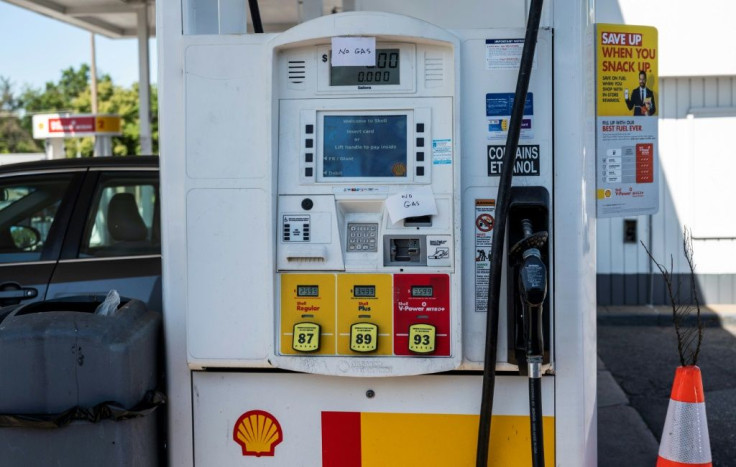Pump Pain: Consumers Slammed By 42% Gas Price Spike
US consumer prices jumped again in July, as spiking gasoline prices continue to fuel inflation, prompting the White House on Wednesday to call for oil producers to open the taps to boost supply.
However, overall inflation came in at a slower pace than the prior month as some impacts of the pandemic shutdowns appeared to dissipate, according to government data released Wednesday.
President Joe Biden hailed the report saying it showed signs of progress as prices begin to come down.
The consumer price index (CPI) rose 0.5 percent last month, seasonally adjusted, after a 0.9 percent surge in June, the Labor Department said.
Energy prices collapsed in 2020 when the Covid-19 restrictions forced business and transport largely to shut down, but have surged recently as widespread vaccinations allowed the economy to begin to return to normal.
Gasoline prices jumped 2.4 percent last month, and spiked 41.8 percent compared to July 2020, the report said.
Prices at the pump have become a political liability for Biden, and the White House called on the OPEC+ producers -- the Organization of the Petroleum Exporting Countries and its allies -- to boost supply to ease the prices spikes.
"Higher gasoline costs, if left unchecked, risk harming the ongoing global recovery," US National Security Advisor Jake Sullivan said in a statement Wednesday .
The recent OPEC+ agreement to increase output is "simply not enough" to fully offset cuts imposed during the pandemic, he said.
Sullivan's statement comes three weeks after the OPEC+ group unveiled an agreement to boost output by 400,000 barrels per day (bpd) each month from August.
The deal means the group's output will be restored to its pre-pandemic level by the end of 2022.
Sullivan also called on US regulators to take action against "any illegal conduct" or market manipulation that might be pushing gas prices higher for American drivers.
Speaking to reporters later Wednesday, Biden acknowledged that "a lot of families are still feeling the pinch. Family budgets remain tight and paychecks don't go as far as they need to."
But he said the easing inflation pressures and jobs gains in recent months are proof his economic policies are working.

"We brought this economy back from a cold start. And there are going to be some ups and downs," Biden said.
Private economists as well as policymakers at the Federal Reserve say price data have been skewed by the unprecedented effort to restart activity after the worst months of the pandemic, but the impact should fade allowing inflation to return to an annual rate closer to the two percent goal.
Total energy prices rose 1.6 percent in July, while food prices rose 0.7 percent, the report said.
But when volatile food and energy goods are left out of the calculation, the core CPI rose just 0.3 percent, seasonally adjusted, just a third of the rate in June.
Over the latest 12 months CPI increased 5.4 percent, unadjusted, stabilizing after several months of sharp increases, while the core rate slowed to 4.3 percent.
"We believe June marked the peak in the in the annual rate of inflation," said Kathy Bostjancic of Oxford Economics, noting that some of the pandemic impacts have "moderated greatly."
However, she cautioned that annual inflation could remain above two percent for some time as "price increases stemming from the reopening of the economy and ongoing supply chain bottlenecks will keep the rate of inflation elevated."
The reopening has led to other disruptions in the economy, including rental car companies rushing to restore their fleets to meet demand from traveling Americans, which drove used car prices to double digit increases in recent months. But they edged up just 0.2 percent compared to June.
Food prices have been another key component taking a bite out of shoppers' wallets, rising 3.4 percent over the past year.
Diane Swonk, chief economist of Grant Thornton, pointed to the outsized gains in costs of proteins at the grocery store like meats, fish, poultry and eggs.
"That category alone is up nearly 15 percent since July 2019, before the onset of the pandemic," she said.
While inflation is showing signs of moderating, the surge in infections caused by the Delta variant of Covid-19 is adding uncertainty to the outlook and "disrupting both supply and demand," she said.
© Copyright AFP 2024. All rights reserved.











